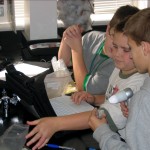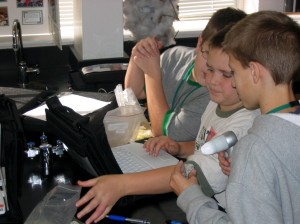
More than 200 schools, districts, universities, state education departments, businesses, and nonprofit organizations have expressed support for a “National Action Agenda” from the Partnership for 21st Century Skills (P21). The agenda lists eight guiding principles that will help build an education system that prepares children to succeed in today’s world, P21 says.
By signing the agenda, the organizations–which include the National School Boards Association, the National Education Association, the National Association of State Boards of Education, the Consortium for School Networking (CoSN), and Pearson Education–have committed to a plan that equips students with the skills and knowledge they’ll need to succeed in the 21st century, P21 says.
“To pursue and secure the American dream, every student from every background must receive a world-class education that includes rigorous core subject and 21st-century skills instruction,” said Ken Kay, P21 president. “The fact that so many schools, districts, and state departments of education have signed on demonstrates that the 21st-century skills movement is gaining momentum in our communities and that we are closer to providing a world-class education for every child.”
The principles that the organizations have agreed to uphold say that the economic and civic viability of the United States depends on its schools’ ability to prepare today’s students for the challenges and realities of this century, including a global, information-based economy. Access to the skills and knowledge needed to succeed in today’s world is the right of every child, and ensuring this must be a national priority, the agenda states.
Keith Kruger, CoSN’s chief executive, said it’s clear that students need 21st-century skills such as creativity, collaboration, and critical thinking to succeed in today’s world.
“That doesn’t mean that the core skills of reading, math, and science go away, but that we also need these new 21st-century skills. CoSN is pleased to support the P21 National Action Agenda because it provides the compelling vision for policy makers and educators on where we need to go,” he said. “As Eric Hoffer said, ‘In times of change, learners inherit the earth–while the learned find themselves beautifully equipped to deal with a world that no longer exists.'”
Here are the agenda’s other principles:
• Wide-scale integration of 21st-century skills and knowledge into the teaching and learning process cannot be accomplished through isolated programs or minor tweaking of existing programs. We must entwine them in our education, labor, economic, and technology/telecommunications policies. Governments at the local, state, and national level must align their education, economic, labor, technology, and commerce functions to support 21st-century education from early childhood through higher education and employee retraining programs.
• It’s not enough simply to respond to these needs rhetorically. Educators and policy makers must act on these needs.
• The United States must address both of its educational achievement gaps–the gap between traditionally underserved communities and their more affluent peers, as well as the overall achievement gap between U.S. students and many of their international peers. We cannot do this in steps; both gaps must be bridged, and all students must be able to compete successfully with their peers around the world.
• 21st-century skills and knowledge are not limited to any particular grade or age level, and they should be incorporated into pre-K through higher education, workforce development, and career retraining programs.
• We must invest in our educational infrastructure so all communities have educational systems that provide students with equal access to 21st-century learning environments.
• Educators must have consistent access to the tools and support systems they need to transition to a 21st-century teaching and learning environment. Both in-service professional development and pre-service education must reflect the realities of high-quality teaching in this century.
• The corporate, public policy, and education sectors should collaborate at all levels to ensure that schools provide high-quality education that equips students for this century. The future viability of all these sectors rests in the success of this mission.
Kathy Hurley, chair of the P21 Strategic Council and senior vice president of strategic partnerships for Pearson Education, said educators face a challenge in transforming teaching and learning in a way that prepares students for the workplace and citizenship of the future.
“These competencies fall into three major areas: learning and innovation skills; information, media, and technology skills; and life and career skills,” she said. “This combination is critical for our children’s success in a world where they are literally studying today for jobs we don’t even know will exist 10 years from now.”
Link:
- 3D equipment helps school lessons take on a whole new dimension - September 3, 2010
- IETF: AT&T’s net neutrality claim is ‘misleading’ - September 3, 2010
- To boost security, Facebook adds remote logout - September 3, 2010

